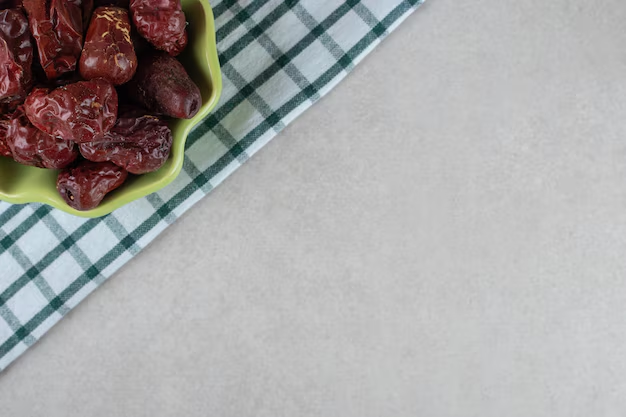How Fresh Are Your Dates? A Comprehensive Guide to Safely Storing Dates in the Refrigerator
Dates, those sweet, chewy fruits, have been a beloved staple in many pantries around the world. Whether you're snacking on them directly, stuffing them with nuts, or using them in your favorite dessert recipes, one question remains pertinent: How long can you keep dates in the refrigerator before they go bad? Given their popularity and numerous health benefits, it's essential to ensure we're storing them correctly to maintain their flavor and nutritional value. This article offers an in-depth look into effective storage techniques for dates and offers valuable insights into their shelf life.
Why Store Dates in the Refrigerator?
Dates are known for their extended shelf life compared to many other fruits, owing to their low moisture content and natural sugars that act as preservatives. However, while dates can be stored at room temperature, refrigerating them extends their freshness and quality further. Cooler temperatures slow down the natural degradation process, preserving both taste and texture.
The Basics of Date Refrigeration
When stored properly in the refrigerator, dates can last between 6 months to a year. Factors like the variety of dates, initial freshness, and how they're stored play a crucial role in determining their longevity.
- Variety Matters: Medjool, Deglet Noor, and Barhi are popular varieties, each with its own storage characteristics.
- Initial Freshness: Always inspect dates before purchase. Look for signs of moisture, mold, or excessive hardening.
- Packaging: Airtight containers or sealed bags minimize exposure to air, which can dry out dates or lead to spoilage.
Signs of Spoilage: When to Toss Out Your Dates
No food lasts forever, and dates are no exception. Understanding the signs of spoilage will help you avoid consuming spoiled dates:
- Texture Changes: Dates should be soft yet firm. Overly hard or mushy spots may indicate spoilage.
- Visible Mold: Mold is a sure sign of spoilage and may appear as white or greenish spots on the surface.
- Unpleasant Odor: Dates typically have a sweet aroma. Off-odors signal bacterial growth or fermentation.
- Discoloration: Dark spots or discoloration signify they're past their prime.
Storage Techniques for Prolonged Freshness
Proper storage goes a long way in maintaining the freshness of dates. Here are practical steps to ensure the best storage:
- Airtight Containers: Use containers that seal completely to keep moisture and external odors out.
- Vacuum Sealing: For long-term storage, consider vacuum-sealing dates to increase their shelf life.
- Use the Crisper Drawer: Storing dates in the crisper drawer of your refrigerator can regulate humidity and temperature effectively.
- Avoid Sunlight: Ensure your containers or bags are opaque or stored away from direct light, even inside the fridge.
Different Types of Dates and Their Storage Nuances
While all dates benefit from the general storage guidelines, each variety has its unique characteristics:
- Medjool Dates: Known for their moist texture, they need refrigeration to avoid drying out.
- Deglet Noor: Typically drier, these dates are quite hardy but will last longer when kept cool.
- Barhi Dates: These are softer and more sensitive, thus requiring careful storage.
The Science Behind Date Preservation
Understanding how date storage works involves delving into the science of food preservation. Dates naturally have low water activity due to their sugar concentration, providing an environment hostile to microorganisms that cause spoilage. Refrigeration takes this a step further, retarding the growth of any surviving bacteria or fungi.
Extending Beyond Refrigeration: Freezing Dates
For those with excess dates or seeking longer storage options, freezing is a viable choice. When frozen properly, dates can last indefinitely, though it's best to consume them within a year for optimal quality.
- Steps to Freeze Dates:
- Wash and Dry: Clean the dates to remove any contaminants. Ensure they're thoroughly dried.
- Portion Control: Divide the dates into manageable portions to avoid thawing all at once.
- Seal and Store: Place them in zipper bags or vacuum-sealed bags, removing as much air as possible before freezing.
Practical Tips for Using Stored Dates
Maintaining freshness isn't just about storage; it's also about usage. Here are some handy tips:
- Use in Cooking: Dates enhance the sweetness of dishes; use them in oatmeal, smoothies, or as a natural sweetener.
- Baking with Dates: Substitute dates for sugar in recipes, keeping in mind their dense texture may alter dish consistency.
- Healthier Snacks: Pair dates with nuts or cheese for a balanced snack high in fiber and nutrients.
Quick Reference Guide: Storing Dates
Here's a summarized guide to help you store and use dates effectively:
- 🗓️ Fresh Dates Last: 6 months in the fridge; up to a year at their best quality when properly sealed.
- 👀 Watch for Spoilage: Mold, off odors, and a significant change in texture.
- 🔌 Storage Tools: Air-tight containers, vacuum sealing, and cool, dark places.
- ❄️ Freezing: Clean, portion, seal, and freeze for indefinite storage.
- 🍴 Usage: Natural sweetener, snacks, and baking. Explore their versatility!
The Bigger Picture: Food Storage and Sustainability
Effective food storage, like keeping dates fresh in the refrigerator, plays a significant role in reducing food waste. By understanding proper storage techniques and regularly checking for spoilage, you extend the life of your food, save money, and help the environment.
Dates are not just a delicious treat but also a sustainable food choice when stored correctly. Keeping food waste to a minimum starts at home, and with the right approach, your dates can continue to delight your palate for as long as possible.
Following these tips ensures your dates remain a delicious, nutritious part of your diet. Explore their versatility in your kitchen, knowing that they're stored safely and sustainably.

